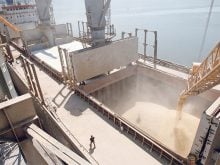An influential conservative business think-tank is suggesting a 20-year phase-out of supply management that would cost farmers more than $10 billion in dairy quota value in the first year.
The C.D. Howe Institute argued in a recent report co-authored by president William Robson that the system of high priced, production-controlling quotas, fixed prices and high border protections costs consumers and the economy.
The report stated that although the system helps a small elite number of farmers, it hurts others more and it undermines Canada’s international trade reputation.
Read Also

Short rapeseed crop may put China in a bind
Industry thinks China’s rapeseed crop is way smaller than the official government estimate. The country’s canola imports will also be down, so there will be a lot of unmet demand.
Along with institute policy analyst Colin Busby, Robson argued that over the next two decades ending in 2029, provincial governments could sell $293 million worth of quota money into provincial treasuries to add 84.7 million kilograms of butterfat production to the market.
It would undermine existing quota value, lower prices and eventually reduce Canadian supply managed product prices to world levels.
“The fact that quota values would decline over time would pressure producers to devise strategies for working without quota supports, becoming more customer focused and entrepreneurial and perhaps even export, as their Australian dairy counterparts did in a spectacular fashion after their system changed,” said the report.
The institute recognized that the protectionist supply management system helped the original farmers who received free quota but argued it has run its course.
“Government control of entry has blunted competition, hampered innovation and slowed entrepreneurship,” it said.
The study said the value of supply management quotas in dairy, poultry and eggs has almost tripled to $28.2 billion in 2008 from $9.6 billion since the 1995 World Trade Organization agreement that created high import tariff protections to replace strict volume import restrictions.














